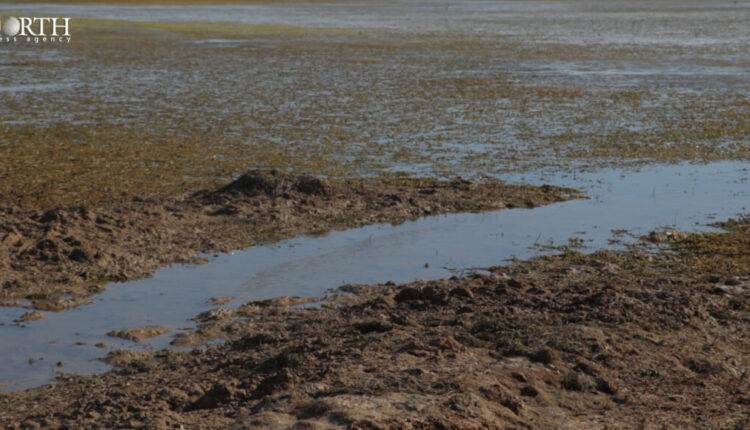
RAQQA, Syria (North Press) – Sitting next to his arid and desolate land, Abdurrahman Abu Muhammad, a farmer from Raqqa Governorate in northern Syria, feels dejected as he reminisces the days when his land used to be fertile and abundant, and he was able to make a livelihood from it. He longs for the time when his land was prosperous and provided him with a source of sustenance.
The 70-year-old Abu Muhammad, from the village of Twaihina in the western countryside of Raqqa, experienced the river’s great days when the water overflowed into the Euphrates River before the building of Euphrates Dam, the man did not expect that the river will dry one day.
Water is the key element to practice farming, and farming is the main source of livelihood for Abu Muhammad. He did not practice any other profession.
The Euphrates Dam is the most important dam in Syria that is used for agricultural projects and electricity generation. However, the amount of water received is not sufficient for electricity generation as it evaporates due to high temperatures.
The farmer expresses his situation by saying, “I can do without bread, but I cannot do without water.”
Euphrates level is diminishing
The water level of the Euphrates River has dropped by five meters recently due to Turkey’s seizure of the river’s water. The flow rate has been limited to 200 cubic meters per second, which is a serious breach of the 1987 water-sharing agreement signed with Syria and Iraq under the United Nations’ supervision.
The 1987 agreement stipulates Turkey’s permanent commitment to pumping 500 cubic meters of water per second from the Euphrates River towards Syria.
The water has become contaminated, inadequate, and contains an excessive amount of impurities such as dirt and bacteria that can spread water-related illnesses among the presidents.
Abu Muhammad’s dire need for agriculture, being his only source of income, motivated him to purchase a diesel engine and acquire extra pipes to extract water from the river.
He is facing a considerable burden due to the high costs associated with the diesel; as they require fuel and spare parts. Also, drawing water from long distances badly affect the engines.
Farmers have had to extend water pipes significantly to extract water from the Euphrates River and follow its course as it recedes hundreds of meters away.
The shortage of water has had a catastrophic impact on the farmers of the region, particularly in the midst of high temperatures causing severe droughts. Furthermore, the desert soil requires a substantial amount of water to be suitable for cultivation, according to Abu Muhammad.
Catastrophe
The farmer warns that if Turkey persists in its strategy of withholding water, it will trigger a significant disaster in the region that will affect the entire population.
Earlier, Imad Obaid, an official at the Euphrates Dam, told North Press that 3.5 billion cubic meters had been depleted of the strategic reserve of the Euphrates Dam’s lake in Tabqa, resulting in the lake’s level dropping to 10.5 billion cubic meters out of 14.5 cubic meters.
Currently, the lake’s water level has declined to 10.5 billion cubic meters out of 14.5 cubic meters, due to its depletion as a result of the lack of water coming from Turkey, according to the official.
Turkey has been withholding water flow in its dams since January 2019, weaponizing the Euphrates River against the Autonomous Administration of North and East Syria (AANES). The northeast regions of Syria are the most affected by Turkey’s water cut-off.
Receding water
After Abdullah al-Eid, 62, planted his land with summer vegetables, he started watering it with a diesel engine and a 500-meter long water pipe, but the lack of water forced him to install additional pipes.
Hamoud al-Hamadin, an official in Tishrin Dam on Euphrates River in the countryside of Manbij, northern Syria, anticipated that the dam will completely be out of service at any time. He said that it operates for only six hours a day, after 85 percent of its lake water level was depleted.
Al-Eid finds himself compelled to borrow the necessary equipment for watering and extracting water. Additionally, he dug the ground to locate the optimal water source to safeguard his crops from harm and prevent any losses.
Negative effects
Due to the significant scarcity of drinking and irrigation water in the area, the farmer expresses concern about the lack of attention from both local and international parties towards the decline of the Euphrates level.
“If this continues, it could have negative effects on the environment and endanger the lives of the region’s residents,” he noted.
Ahmad Osso, director of al-Hurriya Dam in the town of Mansoura, southwest of Raqqa, said on July 22 that the dam’s production decreased from 75 to 14 megawatts per hour due to the lack of water supply from Turkey.
Hassan al-Mustafa, 64, plants summer vegetables annually to provide for his family and earn some income, just like al-Eid.
However, due to the lack of support for farmers and the water shortages and drought that have affected the area, al-Mustafa believes that if this situation persists, many people will be discouraged from engaging in agriculture, leading to a decline in the agriculture in the region.
